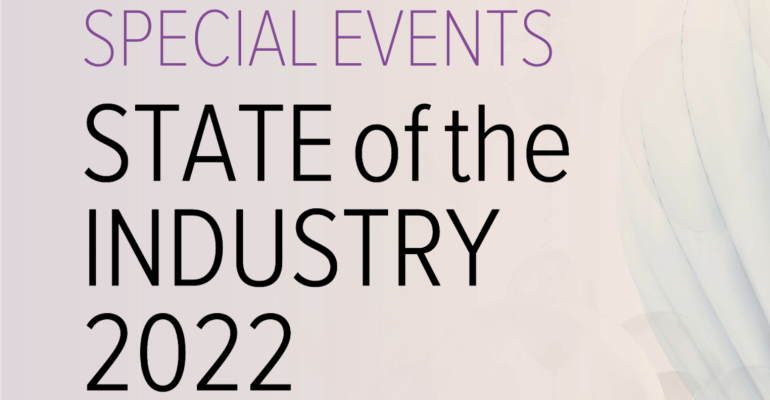THREE-PRONGED SUSTAINABILITY FRAMEWORK
Sustainability might have previously meant “eco-friendly events,” but the definition of this term is being further hashed out to include a more complete picture of environmentally-friendly events. Sustainability also refers to all forms of sustainable business practices, specifically environmental, social, and governance (ESG). ESG frameworks are increasingly the center of sustainability discussions among planners. The Event Leadership Institute (ELI) says that “For event companies, defining ESG and DEI values is important because it also sets standards for the venues and vendors you choose to collaborate with.”
Let’s break down each category:
Environmental
Planners are tired of simply talking about reducing waste and saving the planet. Conversations have turned toward real-world, practical ways to create environmentally sustainable events, using methods like circularity, ethical sourcing, and carbon emission offset.
A recent industry report titled “Finding the Future Together: Towards a More Sustainable B2B Trade-Show Industry in the U.S. and Canada,” revealed that the top environmental impact of tradeshows in these two countries is from greenhouse gas, with 85% of carbon emissions coming from visitor transport and 13% coming from venues themselves.
The Net-Zero Carbon Pledge is the most popular way to deal with these emissions; this initiative is a way for companies across the globe to commit to reaching net-zero carbon emissions by 2040, 10 years ahead of the Paris Agreement. A few events have already managed to achieve net-zero carbon emissions; a recent report from IMEX America showed that their 2021 conference offset 100% of the Las Vegas Convention Center’s carbon emissions. There is still a long way to go as event companies work to get on the same page, but with major players leading the way we are heading in the right direction.
Sustainability continues to be a priority for M&E programs in 2023. Four in five respondents (80%) say their organization takes sustainability into account when planning meetings and events. Of those that say their organization takes sustainability into account, 76% say that their organization has a defined sustainable meeting program strategy.
We at Special Events and The Special Event Show are doing our best to create sustainable events as well. “Catersource + The Special Event are committed to providing both a sustainable and inclusive environment for everyone attending our event,” says Tina Johanson, VP of Event Delivery at Informa Connect. “We challenge ourselves every year to make sure we’re maintaining and exceeding what was done in the past. We’re thrilled to receive a perfect score from Informa’s sustainability group two years in a row and will continue to include activities like local charitable events, onsite digital signage, translation services, and a focus on diverse and inclusive F&B options.”
Social
The United Nations says that social sustainability is “about identifying and managing business impacts, both positive and negative, on people.”Event companies have seen a surge of DEI programs and initiatives in the past few years as a response to sociopolitical happenings. According to The American Express (AMEX) 2023 Global Meetings and Events Forecast, “Incorporating diversity, equity and inclusion (DEI) into meetings and events was also a top priority for meeting professionals. Nearly nine in 10 (87%) respondents say their organization or client actively strives to incorporate DEI in 2023.”
An International Caterers Association (ICA) D&I Community Update webinar that took place this past September touched on the topic of LGBTQ+ weddings, noting that while gay weddings are slowly becoming normalized among event planners, there is a long way to go for trans, non-binary, and queer weddings. The webinar also emphasized the importance of continuing to have DEI conversations so that mindfulness and understanding can keep growing across the industry.
Sensory and neurodiversity have also gained awareness with events, with efforts like The Neu Project, which originated at Google, encouraging “new practical tactics of inclusion for neurodivergent communities, starting with event spaces and programming, workplaces and beyond.” Other organizations like KultureCity work with venues and planners to create sensory-safe environments. See our fall issue for more information on sensory inclusivity.
Governance
Sustainable governance means ethical long-term business practices. This includes corporate governance, codes of business conduct, and risk and crisis management. Sustainable governance looks like top-down business ethics, with event companies practicing transparency and accountability and creating appropriate power dynamics.
An article from Forbes titled “Governance As The Force For Real Change In The ESG World” notes that company leadership needs to be clear about goals, values, and the purpose of a business so that they can maintain best practices.
“Without putting emphasis on the governance model, a business will not be sustainable and consistent in its actions, nor will it be able to anticipate risks and successfully overcome them, even if its environmental and social strategies are well-implemented. Having a clear and robust governance model can allow companies to respond to the needs of the future, not just those of the moment.”
Sustainable governance is the key to successful environmental and social sustainability. Without it, Forbes says, companies “allocate more resources to fighting scandals, retaining demoralized employees, funding public relations campaigns to rebuild their brand and defending claims that result from alleged bad practices.”
In an ELI webinar “SG + DEI in Events: What Planners Need To Consider for 2022,” panelist Erika White, owner and principal consultant for Griffin White Consulting, LLC and Tourism Diversity Matters, talked about the importance of governance for event companies. “You don’t want there to be a disconnect between where you’re having your event and the very values that you represent as an organization.”
ESG is the key for event companies to create real, meaningful sustainability. While there is plenty of room for growth, continuing conversations and event companies taking practical steps are helping the events industry move toward the common goal.
Stay tuned for the rest of our State of the Industry 2022!
To view part 3, click here.





